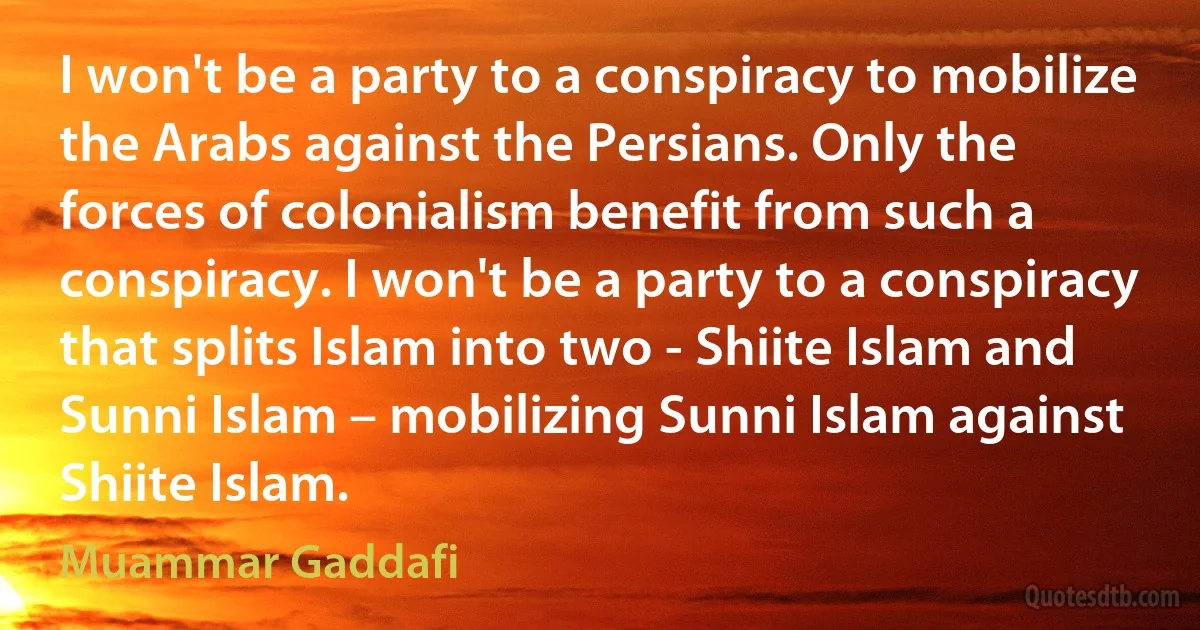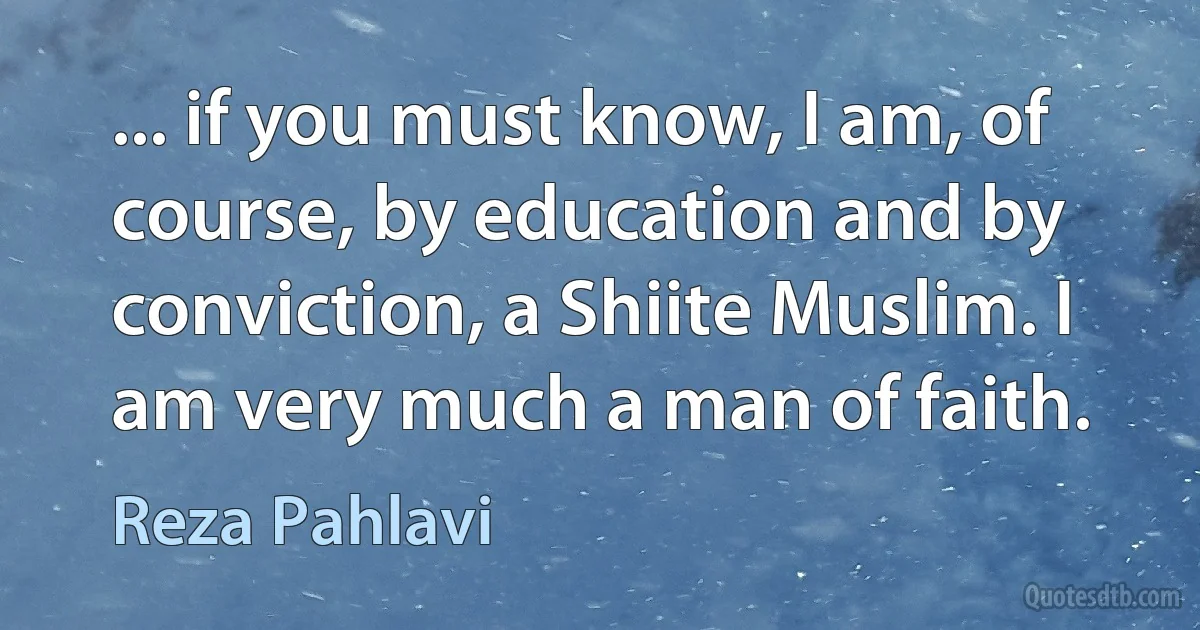Shiite Quotes
Our enemies - whether Shiite or Sunni - are followers of a totalitarian ideology based on Islam, which tells them that Allah wishes to rule the world through them. Israel is a central front in this war. Given the weakness of Western support for the Jews, jihadists see attacking Israel as a strategic tool for eroding the West's ideological defenses and shoring up their supporters throughout the world.

Caroline Glick
Since the beginning of 1979, it has often been said that the Shiite religion, like the ephemeral French Republic of 1792 is "one and indivisible". Nothing could be further from the truth. Those in power do not represent the élite of the hierarchy. Narrow-minded and mediocre, they are as far removed as it is possible to be from the noble ideas of the Prophet. They are ignorant of essential political, economic and social realities of the day, but nonetheless they claim to legislate.

Muhammad Reza Pahlavi
Hashemi Rafsanjani: Take Palestine, for example. We give support to the mujahideen in Palestine. Are they Shiites? No, they are Sunnis. Moreover, they are zealous Sunnis. Hamas is zealous with regard to Sunni Islam, but because of their Jihad and resistance, we supply them with aid. Likewise, when we supplied support in Bosnia-Herzegovina and Kosovo – were they Shiite? It's not like that. Similarly, in Afghanistan, when we gave supported to the Jihad of the mujahideen, we support all the groups – Sunni and Shiite alike – as much as we could. In the Iraq of Saddam Hussein, many of our Sunni brothers found refuge in Iran, just like the Shiite brothers. In Lebanon as well, we gave support when Israel invaded Lebanese territories and occupied them. We gave support to whoever resisted the Israeli occupation in Lebanon. The late sheik Sa'id Sha'ban, who was a close friend of Iran – was he Shiite? He was a Sunni scholar. It's not like that. It is not part of our plan...

Hashemi Rafsanjani
In these circumstances, we would undertake a solemn obligation to help the Iraqi people build a new Iraq at peace with itself and its neighbors. The Iraqi people deserve to be lifted from insecurity and tyranny, and freed to determine for themselves the future of their country. We envisage a unified Iraq with its territorial integrity respected. All the Iraqi people - its rich mix of Sunni and Shiite Arabs, Kurds, Turkomen, Assyrians, Chaldeans, and all others - should enjoy freedom, prosperity, and equality in a united country. We will support the Iraqi people's aspirations for a representative government that upholds human rights and the rule of law as cornerstones of democracy.

George W. Bush
One, a caliphate is a global government, and you know that's where we're headed. Everybody is headed now towards a global government. Well, so are the Islamic extremists, except theirs is Sharia law and infidels will be beheaded. The Shiite Muslims, the ones in Iran, believe in - and not all of them, not the people necessarily on the street - but the real radicals, the revolutionaries and the people at the very top are called Twelvers. They believe in the Twelfth Imam. And that will - that Twelfth Imam, when he returns, he will set up a global caliphate in ancient Babylon. This one should gravely concern you because he has all of the earmarks - in their own writings - of an antichrist, or the Antichrist. I don't know if he is or not. But there are those who will just claim, you know, he's the Twelfth Imam, et cetera et cetera. And the way to get there is global chaos.

Glenn Beck
What a silly question! What a silly person you are! Hezbollah is winning the war; you can see on the other half of the screen. Hezbollah is more popular today in Lebanon amongst Christians, amongst Sunnis, amongst Shiite, amongst all Arabs, amongst all Muslims that it has ever been. It's Israel who's lost the war, and Bush and Blair for politically organizing the war, who've lost politically. This is a defeat of Bush and Blair and Israel. Everybody but you can see it!

George Galloway
What has been clear all these years is that the regime from the get-go was antagonistic; was trying to and continues to try to foment instability -- ultimately to force the region to succumb to some kind of a modern-day Shiite caliphate under Iranian regional hegemony; all of it perhaps backed by the very deterrent we talked about at the beginning of the interview: forcing the world to submit to that as a fait accompli. I find it a little bit difficult for a lot of people to sort of agree to some kind of a fait accompli and say, "Well, there's no way we can change the course of events and Iran will undoubtedly under this regime demand to have its way.” The question is the regime that is in Iran – the regime that has now taken our country hostage and is willing to do anything for its own survival -- and not to be confused with Iran as a country.

Reza Pahlavi
The Iraqi people will hate any government established in Iraq that will be recognized as appointed by the Americans, just as the Americans are hated. The Americans' coming to Iraq was a mistake. Their staying was a mistake. Their behavior with the population was a mistake... They must know that certainly, the Islamic world and chiefly the Shiite world will not stay silent in face of this.

Ali Khamenei
The Pentagon's judgments about the world have generally proved sounder than the CIA's. In the 1960s, the CIA said that the Soviets wouldn't put missiles in Cuba; in the 1970s, that their missiles weren't accurate; in the 1980s, that the missile budget wouldn't bankrupt Moscow; and in the 1990s, that Russia's democratic reforms were irreversible. In each case, the Pentagon argued the opposite case, and turned out to be right. Similarly, in the 1980s, the CIA said that the Soviets weren't sponsoring terrorism, and then, in the 1990s, that Sunni and Shiite terrorists wouldn't cooperate. In each case, again, the Pentagon rightly claimed otherwise.

Mark Riebling
If we regard Iran as a nation, there is no reason it shouldn't have correct relations with the United States or any other country. Decades of opinion polls show that a majority of Iranians have a good opinion of America. But Iran today suffers from a split personality: It is both a nation and, as the Islamic Republic, also a messianic cause. And the Islamic Republic of Iran, far from being part of the solution, is at the root of the conflict tearing the Middle East apart. It has built Shiite militias in Lebanon, Syria and Iraq, not to mention Afghanistan, with the aim of "exporting” its Khomeinist ideology. The mullahs' quest for an empire has provoked violent reaction from Sunni Arabs and enabled terrorist outfits such as al Qaeda in its many versions, including ISIS, to find a new audience and a narrative of victimhood. As long as Iran remains a "cause,” it can't normalize relations with anybody, let alone America. Coexistence among nations is not the same as that among causes.

Amir Taheri


